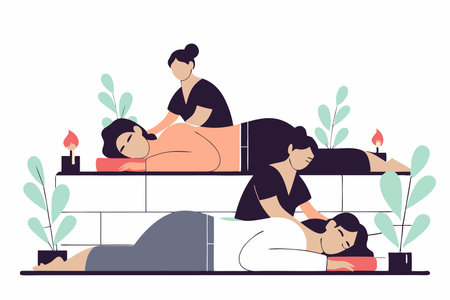Understanding the Link: Sleep and Mental Wellbeing
Quality sleep is often described as the cornerstone of good mental health, and recent findings from the NHS in the UK further reinforce this vital connection. Many Britons find themselves juggling busy schedules, unpredictable weather, and work-related pressures, all of which can disrupt natural sleep patterns. It’s no surprise that insufficient rest is frequently linked to heightened feelings of stress and anxiety. According to the NHS, poor sleep does not just leave us feeling groggy; it can also make it harder to cope with everyday worries, impacting both our mood and emotional resilience. In fact, studies highlight that people who regularly miss out on restorative sleep are more likely to experience symptoms of depression or anxiety. Understanding these connections encourages us to view sleep not merely as a nightly routine, but as an essential pillar for nurturing our mental wellbeing. Embracing small changes rooted in British lifestyle—such as winding down with a herbal tea or keeping a consistent bedtime—can help set the stage for healthier sleep and a calmer mind.
Recognising Stress and Anxiety in Daily Life
Understanding how stress and anxiety show up in our everyday lives is the first step towards building better sleep routines and supporting mental health. In the UK, where busy work schedules and social expectations are common, it’s easy to overlook the signs until they start affecting your wellbeing. Whether you’re working a nine-to-five in London or balancing family life in the countryside, recognising these signs can help you take timely action.
Common Signs of Stress and Anxiety
Stress and anxiety can appear in many ways—sometimes subtly, sometimes more obviously. Here are some frequent indicators as experienced by people across the UK:
| Physical Signs | Mental & Emotional Signs | Behavioural Signs |
|---|---|---|
| Trouble falling asleep Frequent headaches Tense muscles Digestive discomfort |
Worrying thoughts Irritability Feeling overwhelmed Lack of concentration |
Withdrawing socially Snacking more often (especially on tea breaks) Procrastination at work Restlessness or fidgeting |
The Impact of UK Work Culture
UK work culture often values dedication and resilience, but this can sometimes lead to long hours, “presenteeism” (being at your desk even when unwell), and difficulty switching off after work. The pressure to perform, especially in sectors like finance, healthcare, or education, may mean that stress becomes a regular companion. Commuting on crowded trains, coping with unpredictable weather, and balancing commitments can all contribute to daily tension.
Everyday Experiences That Add Up
It’s not just about big events or deadlines; small daily experiences—like checking emails late into the evening, skipping lunch breaks, or feeling guilty for taking time off—can add up over time. Recognising these patterns is crucial in preventing them from disrupting your sleep and overall mental health.

3. Building a Soothing Bedtime Routine
Establishing a calming bedtime routine is essential for supporting restful sleep and nurturing mental health, especially when managing stress and anxiety. In the UK, where the evenings can be long and the weather unpredictable, creating a comforting ritual before bed can make all the difference.
Embrace Gentle Evenings
Start by dimming the lights in your home as dusk falls. This helps signal to your body that it’s time to wind down. Swap out harsh overhead lighting for softer lamps or even fairy lights to cultivate a sense of calm. Consider setting aside electronic devices at least an hour before bedtime, as the blue light from screens can disrupt your natural sleep rhythm.
Natural Ways to Unwind
Enjoying a warm cup of herbal tea, such as chamomile or valerian root, is a cherished tradition in many British households. These natural infusions can help soothe nerves and encourage relaxation. Pair this with mindful activities like gentle stretching, reading a comforting book, or practising simple breathing exercises. These rituals can gently ease you into a more peaceful state of mind.
Create a Sanctuary
Your bedroom environment plays a vital role in quality sleep. Keep your space tidy and free from clutter, perhaps adding touches of nature such as fresh flowers or lavender sachets under your pillow—an age-old remedy for restful slumber in the UK. Make sure your bedding is clean and inviting, opting for soft cottons or linens suited to the season.
Consistency Is Key
The most effective bedtime routines are consistent. Aim to go to bed and wake up at roughly the same time every day, including weekends. Over time, these gentle habits will train your body and mind to associate certain cues with winding down, helping you better manage stress and promote sounder sleep naturally within your British home.
4. Nutrition and Lifestyle Tips for Restful Nights
When it comes to nurturing both sleep and mental wellbeing, the British approach has long embraced a gentle blend of wholesome nutrition and mindful daily habits. Integrating time-honoured dietary choices and subtle lifestyle adjustments can make a noticeable difference in how well you rest and how resilient you feel during stressful times.
The Role of Food in Sleep and Mood
Your evening meal plays an important part in preparing the body and mind for restful slumber. Traditional British favourites such as porridge oats, warm milk, or a light fish supper provide nutrients like magnesium, tryptophan, and vitamin B6—each linked with improved relaxation and serotonin production. Avoiding heavy or rich foods late at night supports digestion and prevents discomfort that might disturb your sleep cycle.
| British Food Tradition | Nutritional Benefit | Sleep & Mood Impact |
|---|---|---|
| Oats (porridge) | High in magnesium and fibre | Promotes calmness, steady energy levels |
| Herbal teas (chamomile, valerian root) | Caffeine-free, soothing herbs | Supports relaxation before bedtime |
| Wholemeal toast with honey | Complex carbohydrates, natural sugars | Aids serotonin release, gentle on the stomach |
Lifestyle Habits for Evening Calm
Simple routines steeped in British culture can help signal to your mind that it is time to wind down. For example, enjoying a cup of herbal tea after dinner, taking a stroll through your local park or garden at dusk, or reading a favourite book under soft lighting all encourage tranquillity. Keeping electronics out of the bedroom and embracing a regular bedtime fosters a healthy circadian rhythm.
Gentle Changes You Can Try Tonight
- Swap late-night caffeinated drinks for warm herbal infusions.
- Create a wind-down playlist of calming British folk music.
- Savour a small bowl of stewed apples with cinnamon—a classic comfort dessert known for its soothing qualities.
Consistency Is Key
As you introduce these gentle changes rooted in local traditions, remember that consistency helps build lasting benefits. Over time, combining nutritional wisdom with mindful routines can ease anxiety, nurture resilience against stress, and pave the way for deeper, more restorative sleep.
5. Mindfulness and Relaxation Techniques
Incorporating mindfulness and relaxation techniques into your daily routine can make a remarkable difference in both sleep quality and mental wellbeing. Evidence shows that practices such as meditation, deep breathing, and gentle yoga help to soothe the nervous system, making it easier to wind down before bedtime and manage feelings of stress or anxiety throughout the day.
Simple Mindfulness Exercises
Mindfulness is all about bringing your awareness to the present moment without judgement. In the UK, many people find comfort in guided mindfulness exercises, such as those offered by Headspace or through the NHS-approved NHS Mindfulness resources. Try setting aside just five minutes each evening to sit quietly, notice your breath, and gently redirect your attention whenever your mind starts to wander.
Progressive Muscle Relaxation
This technique involves tensing and relaxing different muscle groups in turn to release physical tension accumulated during the day. It’s a straightforward practice you can do whilst lying in bed, starting with your toes and slowly working up to your head. Many Brits appreciate this method for its simplicity and effectiveness, especially after a busy workday or during times of heightened anxiety.
Accessible UK-Based Resources
The UK offers plenty of resources for those wanting support in their mindfulness journey. The charity Mind provides helpful guides on incorporating these practices into daily life. Local community centres often host evening yoga or relaxation classes tailored for stress relief. Even a gentle stroll through a local park—embracing nature’s calming presence—can serve as a mindful ritual to bookend your day.
By integrating these evidence-based relaxation techniques into your bedtime routine, you may find not only improved sleep but also greater resilience against daily stresses. Remember, small changes practised consistently can have a significant impact on both mental health and overall wellbeing.
6. When to Seek Professional Help
While establishing a gentle sleep routine and prioritising self-care can make a real difference to your mental health, there are times when more support is needed. Knowing when to reach out for professional help is an important part of looking after yourself, especially if stress or anxiety begin to feel overwhelming or persistent.
Recognising the Signs
If you find that difficulties with sleep, stress, or anxiety are starting to interfere with your daily life, it may be time to seek guidance. Signs include struggling to get through the day, feeling persistently low or hopeless, experiencing panic attacks, or finding that your worries prevent you from working, socialising, or enjoying activities you used to love. Prolonged insomnia—such as not sleeping well for several weeks—can also be a red flag that extra support is needed.
Reaching Out in the UK
The NHS provides a range of mental health services designed to help people manage stress, anxiety, and sleep issues. You can start by speaking with your GP, who can offer advice, prescribe treatment if necessary, and refer you to talking therapies such as cognitive behavioural therapy (CBT). In England, you can also self-refer to local NHS talking therapies services (IAPT) without needing a GP appointment.
Support Beyond the NHS
There are also many charities and helplines across the UK offering confidential support and guidance. Organisations like Mind, Samaritans, and Rethink Mental Illness provide resources and someone to talk to at any time of day. Remember: reaching out for help is a sign of strength—not weakness—and there’s absolutely no shame in asking for support when you need it.
By recognising your limits and seeking professional assistance when necessary, you’re taking an important step towards better sleep and improved mental wellbeing. Combining this support with a mindful routine can help you navigate stressful times more naturally and gently—giving yourself the best chance of restoring calm and balance in your everyday life.


